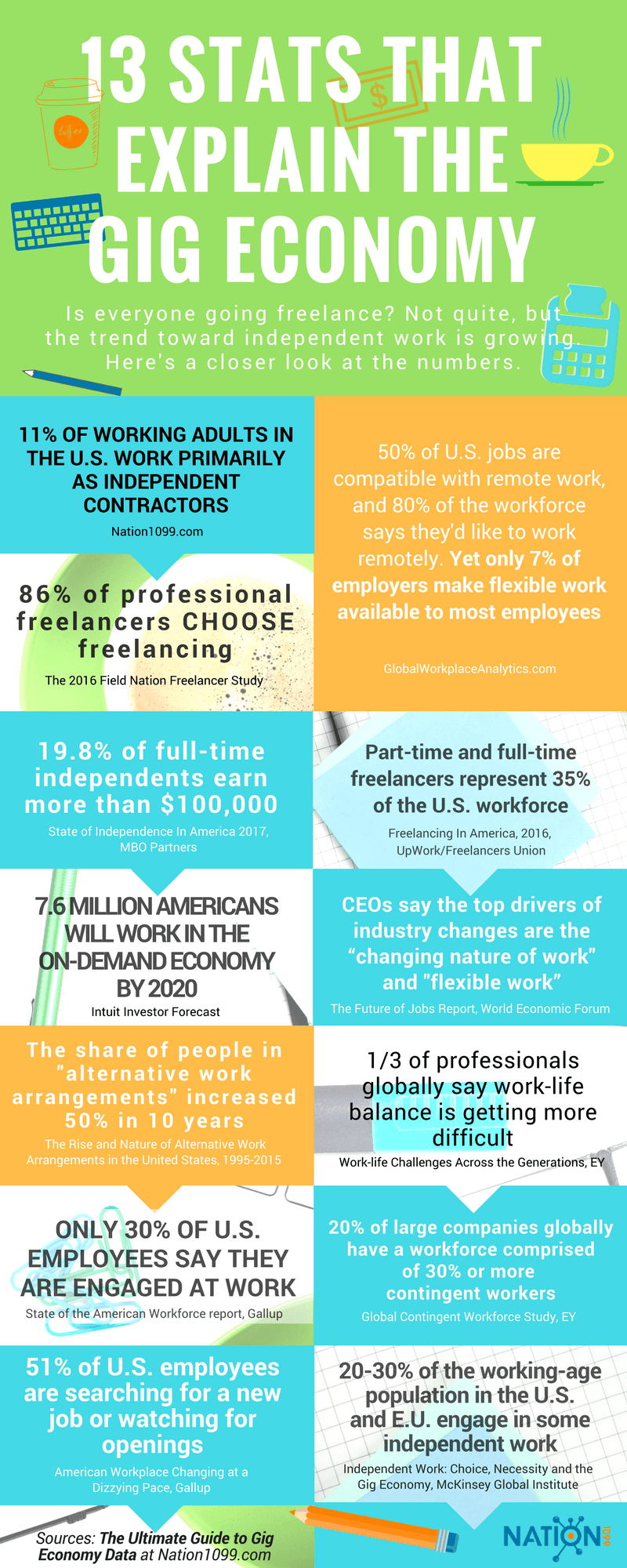

Quick Links
Quick Links

Are you ready to take advantage of hiring freelancers?
If your business is competing with others for skilled and experienced workers, then the growth of freelancing can be a significant complication for you. But if you run a nimble business, hiring freelancers presents a significant opportunity to gain an advantage over your competition . . . if you can develop a modern talent strategy and effective procedures.
The Advantage of Hiring Freelancers
Hiring freelancers is going to be inevitable for most businesses, and a talent management strategy with a W-2 centric view of the world is going to fall behind.
This becomes obvious when you read deeply into the data as my colleagues and I at Nation1099 have been doing. We have an in-depth literature review of over 20 high-quality sources of data and about how the workforce is being affected by the gig economy, (the highlights of which are summarized in the infographic below).
We estimate that 11 percent of the total workforce is full-time freelance in lieu of W-2 regulars. (The 35 percent figure you may have seen before includes W-2 workers who freelance part-time or occasionally.) This career freelancer group has doubled in the last 10 years and is projected to grow 3.5 percent per year going forward.
The data means that more than 1 in 10 of the people in the total talent pool you are looking for have removed themselves from consideration. They don’t want to work for you.
We know that because more than 80 percent say freelancing is their ideal way of working. More than 50 percent say they don’t want to return to the W-2 life at any price. By transitioning to hiring freelancers, you can reengage their interest and tap into this pool that isn’t interested in working for the competition.
The big drivers of these numbers are declining engagement and a declining sense of mission at work, frustration over the slow progress on work/life balance and a strong preference for flexible and remote work. This is where the opportunity lies; hiring freelancers who are no less experienced than regulars, more available to you as a business owner, and now happier at work, freelancing.
You can and should improve on those issues to hang on to more workers and improve recruitment. That is only part of the available strategic advantage, however.
Workforce Structural Changes
There are four other structural changes happening in the workforce that your business needs to pay attention to.
- Freelancing is expanding horizontally from industries that have always relied on freelancers, like publishing, to every industry you can image. Your industry isn’t immune to this trend. Your advantage is in adjusting to the times and hiring freelancers for your business needs.
- Freelancing is expanding vertically from creative services like design and writing. It is expanding downward into low-skill personal services like cleaning and driving and upward into highly-skilled activities that traditionally have director, VP and chief in their titles. The outsourced director of marketing or the consultant specializing in sales operations are examples. Your advantage is in hiring freelancers who are both highly skilled and experienced professionals.
- Freelancing is expanding to every skill set you can image. If it can be conceived of as a project rather than as a role, then it can be the basis of a freelance career. Nobody should assume that a given role will never be outsourced because it is so hands-on and idiosyncratic. Roles are made up of tasks, and new tasks are digitized every day. Your advantage is in identifying those tasks and translating them into freelance hires.
- Economic distress is driving less of the move to freelancing than it did a generation ago. Even the small share or workers who come to freelancing because of layoffs learn to prefer it. Many haven’t gone back to traditional work since hiring freelancers has steadily become more popular over the last nine years. Freelancers are no longer people who are “between jobs.” Freelancing is now a career choice that most of them strongly prefer. Your advantage is in attracting this top talent by being open to remote hiring.
The above trends create a classic glass-half-empty/glass-half-full scenario. If your talent management strategy is attached to its procedures and policies for W-2 hires, then you are going to see this flight to freelancing as a threat.
But if you can organize your approach to talent around a hybrid of W-2 and 1099 workers, then you are going to have a strategic advantage over your competitors. You are going to grow your total talent pool by 11 percent and get access to some of the best talent out there in highly-competitive domains like software development, project management and digital marketing.
This group may not want to work for you, but they do want to work with you. You can have that advantage by simply refocusing your perspective to create a freelancer-friendly environment.
Make the Upgrade
Exactly how do you do take this updated talent management approach? I’ve written elsewhere about working effectively with freelancers, so we won’t get into tactics here. In any case, I’m not an H.R. professional, so I confess that I’m mostly diagnosing trends rather than prescribing responses. I’d love to hear what H.R. professionals think in the comments below.
But from my own experience and from talking with the Nation1099 community, I do believe this: Working effectively with freelancers boils down to the same fundamental issues as working with regulars. You need a serious plan to recruit, onboard, engage and retain freelancers.
Perhaps you are thinking that recruiting makes sense. You need to keep the pipeline flowing. But onboarding, engaging and retaining may sound counter-intuitive. After all, freelancers are outsiders and short-term, right?
That’s where the real advantage lies, the secret strategic opportunity that everyone else doesn’t know. If you approach this growing part of the workforce as if they are inevitably outsiders and short-term, then you’ll be leaving value on the table. You’re not giving this ambitious and engaged part of the workforce a chance to provide all the value to you that they are capable of. Freelancers can bring value to your business over the long term if you can fully embrace them and treat them like part of your company.
You can separate your business from the rest of the pack. If you treat freelance hires as truly hybrid, you can win on all fronts. Make everyone feel welcome. Give everyone the context and tools they need to succeed on a project. Treat everyone like professionals with whom you expect to have a long relationship, even if the current contract is limited. Hiring freelancers with long-term goals in mind is the right track for a talent strategy that accounts for today’s trends in the workforce. You’ll get the best people, and you’ll get their best work. Moreover, you’ll get the flexibility and dynamism that the move to freelancing promises.

Robert McGuire owns McGuire Editorial content marketing agency and is the publisher of Nation1099, a forum for professional freelancers working to grow their gig economy businesses.



I love how you listed the importance and advantages of hiring freelancers in a business. There are a lot of experienced workers online that can be very helpful in saving time for other important projects. Many business owners still don’t realize this.